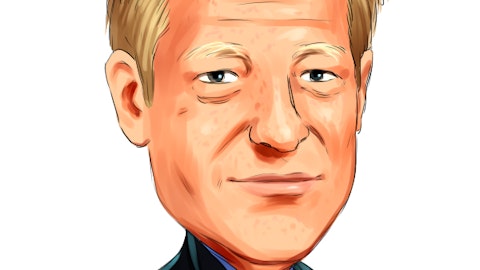David Fisher: Yes. No, it’s a great question. Certainly something we’ve started thinking about as well. We — yes, we have definitely seen when credit is limited in other parts of the market that it benefits us. Whether it’s from a competitive basis or a regulatory basis, our products are ones consumer want. They’re solid. They’ve been in the markets for a long time. We don’t charge a lot of those kinds of fees that are getting a lot of that attention. So we’ll keep an eye on it. But tightening or elimination of credit in other areas of the economy has been beneficial to us in the past.
Operator: The next question comes from Vincent Caintic with Stephens.
Vincent Caintic: Just following up on the SMB question earlier. So just wondering if you could take us through sort of your expectations for SMB if you were to go through a mild recession. So I know on the consumer side, the consumer, as you pointed out, kind of is very adept at managing and is kind of in a recession most of the time. I’m just wondering if you could expand on the small business side. What is the small business customer kind of thinking or worrying about right now? And then as we go through the cycle, how does that behavior typically change?
David Fisher: Yes. No, great question. We are being very conservative with our small business lending right now. There’s a tremendous amount of demand. I think both demand from businesses who need money coming out of COVID still but also from a lack of competition and a reduction of competition. So there’s a tremendous amount of demand. We’re filling a very small portion of it as we are trying to remain very, very conservative with respect to our originations, so we can manage through any turmoil in the economy. And that’s really our approach to it. I think where on the consumer side, you tend to have a lot of people who act similarly kind of all at the same time but you have a very large book. That’s kind of how you manage through it with very high spreads.
On the small business side, our focus is really on diversification, diversification across states, across industries, across product types and across kind of the credit spectrum. And we think that diversification is really what provides the protection in a recessionary environment for us, especially an environment that looks like the one we’re likely to be in for the next 6 months to a year where it’s more choppy. Obviously, you have a giant hit to the economy like you did in 2008 or 2009. You’re likely to feel pain across all those spectrums. But as we’ve just seen over the last 6 to 12 months, there are some industries that are doing well for a couple of quarters and some that are doing worse and then that rotates. And having that strong diversification has allowed us to manage through that variability over the last couple of years without too much difficulty.
So that’s kind of our approach, kind of our thought process going forward. This doesn’t look like a recession that’s going to bring down all kinds of businesses all at once. So that diversification effort and having portfolio limits across states, across loan types, across industries, we think, is really — is going to allow us to continue to manage a strong book through this period.
Vincent Caintic: Okay, great. And following up on small business again. So you pointed out that your share is low as a percentage of the overall market even though you’ve grown so well. So if you kind of play out how you plan to expand and maybe take share from that, is that sort of competitors pulling back maybe in a recessionary environment while you’re able to underwrite better? Or is there product expansion or just sort of thinking of how you can expand on that — on the TAM opportunity versus your competitors?





